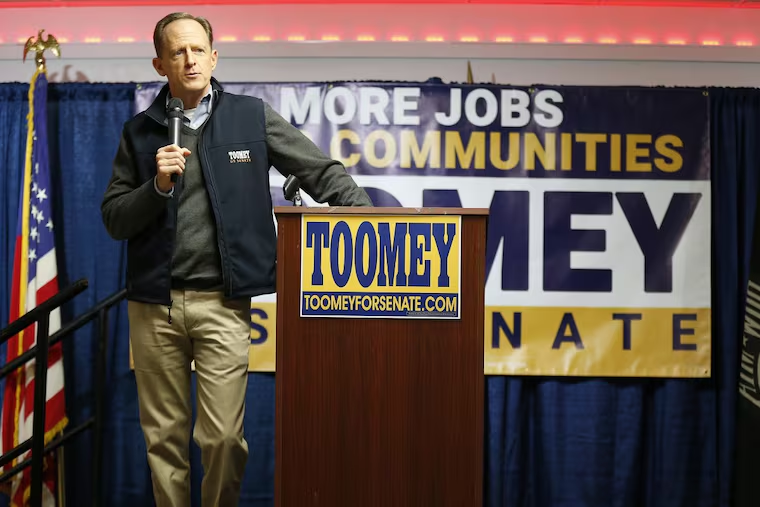With a new term, Pat Toomey flexes his muscles on health care, taxes
Fresh off a near-political-death experience - winning reelection by 1.5 percentage points - Sen. Pat Toomey (R., Pa.) has dived into the two most contentious legislative battles of 2017, authoring conservative proposals and pushing his colleagues to go farther than many are first inclined. He began by pushing for sweeping Medicaid changes in the GOP's proposed health care overhaul, and now is pushing for a big, long-lasting tax cut plan.

WASHINGTON — Pat Toomey is making the most out of his new term in the Senate.
Fresh off a near-political-death experience — winning reelection last year by 1.5 percentage points — the Pennsylvania Republican has dived into the two most contentious legislative battles of 2017, authoring conservative proposals and pushing some colleagues to go farther than first inclined.
Toomey began the year by serving as a leading voice for rolling back the Affordable Care Act; he wrote one of the most controversial parts of the Senate GOP's initial proposal, a plan to drastically scale back Medicaid spending.
Now, he is in the middle of talks over Republicans' second major push: rewriting the tax code and slashing what people and businesses pay.
He was one of six senators who dined with President Trump last week at the White House to talk taxes, and on Tuesday helped hammer out an internal GOP agreement that clears the path to larger tax cuts than some of his Republican colleagues had initially envisioned.
The budget deal with Sen. Bob Corker (R., Tenn.), sets the stage for $1.5 trillion worth of tax cuts over the next decade, even if it increases the federal debt — an idea some Republicans opposed but that Toomey argued in favor of.
Toomey's role in drawing a key parameter of the burgeoning tax package reflects his standing within the party.
Despite not holding a formal leadership post, he is one of the GOP's most respected brains on fiscal policy, and he is close to both Senate Majority Leader Mitch McConnell and House Speaker Paul Ryan — with whom he once shared a D.C. home. The two huddle to hash out tax policy.
So while some Republicans argued that rate cuts should be paired with other tax changes, like closing loopholes, in order to keep federal revenue level, Toomey countered that a tax package would have to go beyond those limitations to be big enough and long-lasting enough to spur the economy — even if those changes might increase the debt. (And he argues that tax breaks will spark enough economic activity to help offset any losses in federal revenue, an idea fiercely debated among economists).
That Toomey ultimately cut a deal with Corker shows his eye for the possible, even while pushing strongly conservative fiscal views in both the health and tax debates.
"He's one of the rare folks that has credibility on both the more mainstream side of the (Republican) caucus and the more conservative side of the caucus," said Josh Novotney, a Toomey political adviser and former aide, citing the senator's respect on the right, policy knowledge and willingness to cut deals. He spoke by phone Tuesday before the budget plan was announced.
These are not the issues Toomey emphasized in his reelection campaign last year, when he was all about sanctuary cities, public safety and the Iran nuclear deal, but be clear: this is what he came to Congress to do.
The former derivatives trader, owner of a small chain of sports bars and head of the fiscally conservative Club for Growth has built his public career on cutting spending, slashing government regulations and lowering taxes, all in the name of loosening the economy to produce growth.
He has pushed these ideas before he ever arrived in the Senate — "More jobs, less government, Pat Toomey," said the tagline of one of his 2010 campaign ads — but hasn't had the political power to make them happen, and for the past two years had to walk an electoral tightrope as he eyed a difficult 2016 campaign.
Now, with a new Senate term secured, Trump in the White House, and Republicans controlling Congress, Toomey has his chance, and he is forcibly pushing conservative fiscal priorities.
The ACA fight was one opening. Toomey's plans on "Obamacare" had less to do with health-care policy and more to do with reining in the cost of a so-called entitlement program, something he has tried to advance for years. (It also proved to be a sticking point for some Republicans who balked at such sweeping changes to Medicaid).
Revising the tax code and cutting tax rates would be a potentially legacy-defining victory for a man who has crusaded for those kinds of steps for nearly two decades in public life.
Having campaigned so hard for another term in an ugly and expensive Senate election, he's not letting this chance pass quietly.